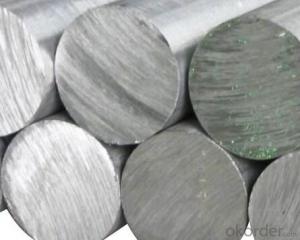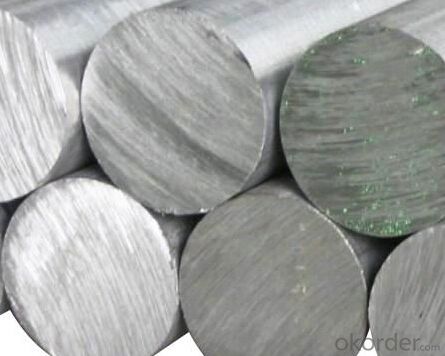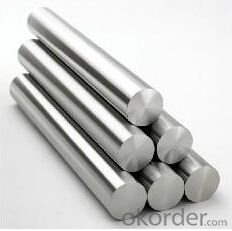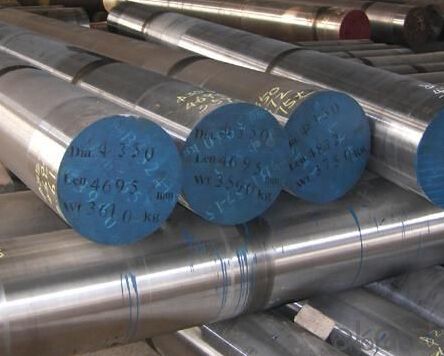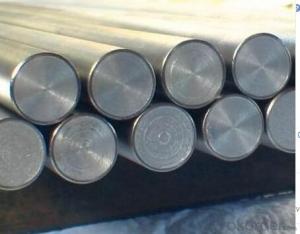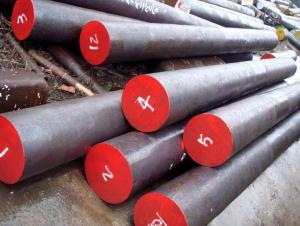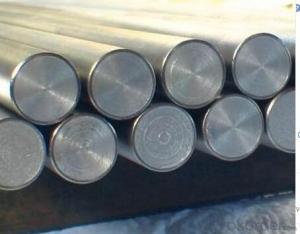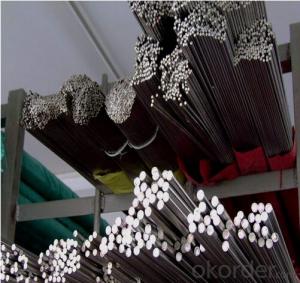Stainless Bearing Steel Grade GCr15
- Loading Port:
- China Main Port
- Payment Terms:
- TT or LC
- Min Order Qty:
- 50 m.t.
- Supply Capability:
- 1000 m.t./month
OKorder Service Pledge
OKorder Financial Service
You Might Also Like
Product Description:
OKorder is offering Stainless Bearing Steel Grade GCr15 at great prices with worldwide shipping. Our supplier is a world-class manufacturer of steel, with our products utilized the world over. OKorder annually supplies products to European, North American and Asian markets. We provide quotations within 24 hours of receiving an inquiry and guarantee competitive prices.
Product Applications:
Stainless Bearing Steel Grade GCr15 are ideal for structural applications and are widely used in the construction of buildings and bridges, and the manufacturing, petrochemical, and transportation industries.
Product Advantages:
OKorder's Stainless Bearing Steel Grade GCr15 are durable, strong, and resist corrosion.
Main Product Features:
· Premium quality
· Prompt delivery & seaworthy packing (30 days after receiving deposit)
· Corrosion resistance
· Can be recycled and reused
· Mill test certification
· Professional Service
· Competitive pricing
Specifications of Stainless Bearing Steel Grade GCr15
1. Dimensional sizes: Thickness: 14~100mm.Length:3000~5800mm,Diameter :14-500mm
2.Chemical composition:
C | Si | Mn | Cr | Ni | Cu |
Equal or less than | |||||
0.95-1.05 | 0.15-0.35 | 0.20-0.40 | Cr:1.30-1.65 | 0.30 | 0.25 |
3. Grade: SAE51200/ GCr15 / 100cr6
4. Heat Treatment:
Soft annealing: heat to 680-720°C, cool slowly.
Hardness after annealing: Max. 241 HB
Hardening: 820 - 850 °C
Normalizing temperature: 840-880°C
Tempering: 540-680°C
5. Surface requirements: Black, grinding, bright, polish
6. Characters:
1) Comprehensive properties
2) Good performance in cutting and processing after spheroids annealing
3) High hardness and homogenization after quenching and tempering
4) High abrasive resistance and fatigue resistance
7. Payment terms: T/T or L/C at sight
Usage & Applications of Stainless Bearing Steel Grade GCr15
Our products have been used in all kinds of areas, such as aviation, aerospace, navigation, nuclear, energy, chemical industry, electronic information, petrochemical, automotive, instrument and meter, Communication ,transportation, and medical instruments, etc. Bearing ring,steel rolling mill ,machinery, 100Cr6 bearing steel ball is widely used in high-speed and low-noise bearing, bicycle, motorcycle, automobile, bags, electronics.
Packaging & Delivery of Bearing Steel GCr15
Mark: Heat No. will be cold stamped and Steel grade, diameter (mm), length (mm), and the manufacturer LOGO and weight (kg) is painted.
Standard seaworthy packing or as customer required
Delivery time: Within 30 days after order is confirmed.
Note:
1. According to national standard (GB) for our products, if not, supply according to national standards (GB) or agreement.
2. We can not only provide electric furnace +LF+VD and electro-slag re-melting (ESR)steel forging materials, but also forging products of piece, bar, etc.
3. Our company is equipped with roll equipment and can provide our customers with roll billets or finished.
4. Please send us your detailed specifications when inquire. We will reply to you ASAP.
FAQ:
Q1: Why buy Materials & Equipment from OKorder.com?
A1: All products offered byOKorder.com are carefully selected from China's most reliable manufacturing enterprises. Through its ISO certifications, OKorder.com adheres to the highest standards and a commitment to supply chain safety and customer satisfaction.
Q2: How do we guarantee the quality of our products?
A2: We have established an advanced quality management system which conducts strict quality tests at every step, from raw materials to the final product. At the same time, we provide extensive follow-up service assurances as required.
Q3: How soon can we receive the product after purchase?
A3: Within three days of placing an order, we will begin production. The specific shipping date is dependent upon international and government factors, but is typically 7 to 10 workdays.
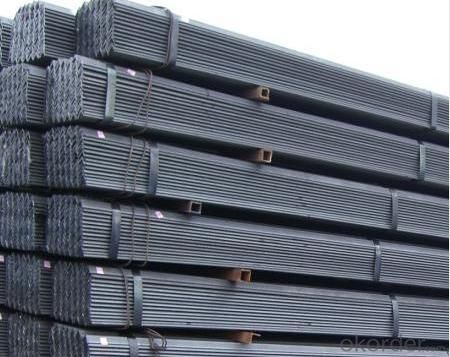
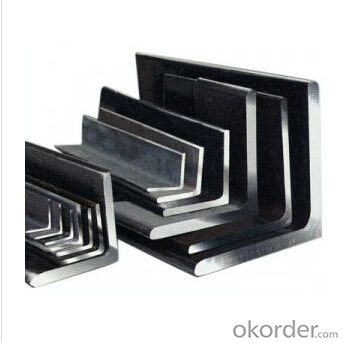
- Q: What are the applications of special steel in the aerospace sector?
- Special steel has various applications in the aerospace sector due to its exceptional properties. It is used for manufacturing critical components such as turbine blades, landing gear, and structural parts. The high strength, corrosion resistance, and heat resistance of special steel make it ideal for withstanding extreme conditions experienced during flight. Additionally, its lightweight nature contributes to fuel efficiency and overall performance improvement in aircraft.
- Q: What are the main applications of special steel in the pharmaceutical industry?
- Special steel is widely used in the pharmaceutical industry for various applications. One of the main applications is in the manufacturing of pharmaceutical equipment and machinery, such as mixing tanks, reactors, and storage containers. Special steel is preferred for these applications due to its superior corrosion resistance, high strength, and durability, ensuring the safety and hygiene standards required in the pharmaceutical industry. Additionally, special steel is also used for the production of precision instruments and tools used in pharmaceutical research and development, ensuring accurate measurements and reliable results.
- Q: What are the common challenges in welding special steel?
- Welding special steel can present several challenges that differ from welding regular carbon steel. Some common challenges in welding special steel include: 1. High carbon content: Special steels often have a high carbon content, which can lead to increased hardness and brittleness. This can make it more difficult to achieve a proper weld without experiencing cracking or other defects. 2. High alloy content: Special steels often contain various alloying elements, such as chromium, nickel, or molybdenum, which can impact the weldability. These elements can introduce complexities, such as increased susceptibility to heat-affected zone (HAZ) cracking or the formation of brittle phases. 3. Heat sensitivity: Special steels are often more sensitive to heat input during welding. Excessive heat input can result in grain growth, reduced mechanical properties, or distortion of the welded structure. Therefore, careful control of heat input and preheating techniques may be necessary. 4. Pre-weld and post-weld treatments: Special steels may require specific pre-weld and post-weld treatments to ensure proper weld quality and performance. These treatments can include preheating, stress relieving, or post-weld heat treatment. Failure to follow these procedures can lead to the development of residual stresses or reduced mechanical properties. 5. Joint design and fit-up: The design and fit-up of the weld joint can also pose challenges. Special steels may require specific joint configurations, such as a double-V or double-U groove, to ensure proper penetration and fusion. Additionally, tight tolerances may be necessary to maintain the desired mechanical properties of the welded structure. 6. Welding process selection: The choice of welding process can greatly impact the success of welding special steel. Some processes, such as TIG or laser welding, may be more suitable for welding high-alloy steels, while others like MIG or submerged arc welding may be better suited for specific applications. Selecting the appropriate welding process is crucial to achieving a sound weld with the desired properties. To overcome these challenges, it is essential to have a thorough understanding of the specific type of special steel being welded and to follow proper welding procedures and techniques. This may involve conducting pre-weld qualification tests, employing suitable welding consumables, and ensuring proper heat control throughout the welding process. Additionally, working with experienced welders and seeking guidance from experts in special steel welding can help overcome these challenges effectively.
- Q: What are the requirements for special steel used in surgical instruments?
- The requirements for special steel used in surgical instruments are quite stringent due to the critical nature of their application in medical procedures. First and foremost, the steel must have excellent corrosion resistance to withstand the repeated exposure to body fluids and chemicals used in sterilization processes. This ensures that the instruments remain durable, hygienic, and safe for use. Another essential requirement is high strength and hardness, as surgical instruments must be able to withstand the forces exerted during procedures without bending, breaking, or losing their sharpness. Additionally, the steel should possess excellent wear resistance to maintain its cutting edge for an extended period, reducing the need for frequent sharpening or replacement. Biocompatibility is another crucial factor for surgical instruments. The steel should not cause any adverse reactions when in contact with living tissue or fluids, minimizing the risk of infection or complications for patients. This requires the absence of harmful elements or impurities that may trigger allergic responses or toxicity. Furthermore, the steel used in surgical instruments must be highly sterilizable. It should be capable of withstanding high temperatures during autoclaving or other sterilization methods without undergoing significant changes in its physical or mechanical properties. Lastly, the steel should be easily workable, allowing for precision manufacturing processes such as forging, machining, and polishing to create intricate instrument designs. This ensures that surgical instruments have the necessary shape, size, and surface finish required to perform specific tasks effectively. Overall, the requirements for special steel used in surgical instruments encompass corrosion resistance, strength, hardness, wear resistance, biocompatibility, sterilizability, and workability to ensure the instruments meet the demanding standards of the medical field.
- Q: What are the main characteristics of creep-resistant steel?
- Creep-resistant steel, characterized by its high resistance to deformation caused by prolonged exposure to high temperatures and stress, possesses several key features: 1. It can withstand extremely high temperatures without significant deformation, making it ideal for applications in power plants, boilers, and gas turbines, where materials are exposed to elevated temperatures for extended periods. 2. It exhibits excellent mechanical properties, including high tensile strength and toughness, enabling it to endure stress and pressure, even at high temperatures. 3. It is highly resistant to corrosion and oxidation, owing to its alloying with elements like chromium, molybdenum, and nickel. This makes it suitable for use in environments with moisture, chemicals, and gases. 4. It maintains its shape and size under prolonged exposure to high temperatures and stress, ensuring dimensional stability and preserving the integrity of structures or components. 5. Its combination of high temperature resistance, strength, and corrosion resistance contributes to its durability and longevity, reducing the need for frequent maintenance and replacement. This improves the overall efficiency and cost-effectiveness of applications relying on creep-resistant steel. In conclusion, creep-resistant steel is specifically designed to endure the challenging conditions of high temperatures and stress, making it the preferred choice in industries prioritizing reliability and safety.
- Q: What are the different carburizing techniques used for special steel?
- There are several carburizing techniques used for special steel, including gas carburizing, pack carburizing, liquid carburizing, and vacuum carburizing. Each technique involves introducing carbon into the surface of the steel to enhance its hardness and wear resistance. Gas carburizing involves heating the steel in a controlled atmosphere of carbon-rich gas, while pack carburizing entails surrounding the steel with a mixture of carbon-rich material and heating it. Liquid carburizing involves immersing the steel in a bath of molten salts or other carbon-rich liquid, and vacuum carburizing utilizes a low-pressure environment to introduce carbon into the steel's surface. These techniques are chosen based on the specific requirements of the steel and the desired end properties.
- Q: What are the properties of electrical steel?
- Electrical steel, also known as silicon steel or transformer steel, possesses several key properties that make it suitable for various electrical applications. Firstly, it exhibits low core loss, meaning it has a low tendency to dissipate energy in the form of heat when subjected to alternating magnetic fields. This property is crucial for efficient power transmission and distribution. Additionally, electrical steel demonstrates high magnetic permeability, enabling it to efficiently conduct and amplify magnetic flux, essential for transformers and other electrical devices. Furthermore, it has a high electrical resistivity, allowing it to minimize eddy current losses, which occur when currents circulate within the material. Lastly, electrical steel exhibits high saturation flux density, making it capable of handling high magnetic fields without reaching its magnetic saturation point. Overall, these properties make electrical steel an ideal material for power generation, transformers, motors, and other electrical equipment.
- Q: What are the different methods of preventing stress corrosion cracking in special steel?
- There are several methods to prevent stress corrosion cracking in special steel. One common approach is to select a steel alloy with enhanced resistance to stress corrosion cracking. This can be achieved by adding alloying elements such as nickel, chromium, or molybdenum, which help improve the steel's corrosion resistance. Another method is to control the environment in which the steel is exposed. This can involve minimizing exposure to corrosive substances or adjusting temperature and humidity levels. Additionally, surface treatments such as passivation or coating can be applied to create a protective barrier against corrosion. Regular inspection and maintenance of the steel structure are also important to identify and address any potential sources of stress corrosion cracking.
- Q: Can special steel be used in the wastewater treatment industry?
- Yes, special steel can be used in the wastewater treatment industry. Special steel, such as stainless steel or corrosion-resistant alloys, is often utilized in the construction of equipment and infrastructure used in wastewater treatment plants. These materials offer high resistance to corrosion, chemicals, and harsh operating conditions, ensuring durability and longevity in wastewater treatment processes. Additionally, special steel's hygienic properties make it suitable for applications where cleanliness and sterilization are crucial.
- Q: What are the different high-pressure grades of special steel?
- There exist several distinct varieties of special steel that are designed to withstand high pressures, each possessing its own unique characteristics and uses. Some frequently employed high-pressure grades of special steel encompass the following: 1. 4130 steel: This particular grade of steel is renowned for its exceptional strength, toughness, and resistance to heat. It finds considerable application in the fabrication of high-pressure tubing and components for the oil and gas industry. 2. 4340 steel: Distinguished by its extraordinary strength and toughness, this grade of steel is commonly utilized in the production of critical components like high-pressure valves, gears, and other crucial parts in industries such as aerospace, defense, and automotive. 3. 316 stainless steel: Highly resistant to corrosion and boasting excellent high-temperature properties, this stainless steel grade is frequently employed in high-pressure scenarios like pipelines, heat exchangers, and pressure vessels within the chemical and petrochemical industries. 4. 17-4 PH stainless steel: Offering a combination of high strength, superb corrosion resistance, and good toughness, this stainless steel grade often finds application in high-pressure pump components, turbine blades, and other vital parts within industries like power generation and aerospace. 5. F22 steel: Classified as a low-alloy steel with remarkable high-temperature strength and exceptional resistance to creep, this grade of steel is commonly used in high-pressure and high-temperature environments such as boilers, pressure vessels, and piping systems found in power plants and refineries. The aforementioned examples represent just a small selection of the available high-pressure grades of special steel. The appropriate grade choice is contingent upon the specific requirements of the application, encompassing factors such as pressure, temperature, corrosion resistance, and mechanical properties.
Send your message to us
Stainless Bearing Steel Grade GCr15
- Loading Port:
- China Main Port
- Payment Terms:
- TT or LC
- Min Order Qty:
- 50 m.t.
- Supply Capability:
- 1000 m.t./month
OKorder Service Pledge
OKorder Financial Service
Similar products
Hot products
Hot Searches
Related keywords
